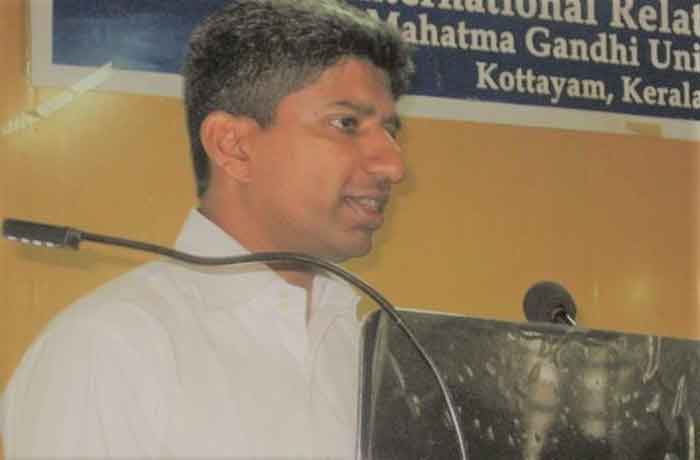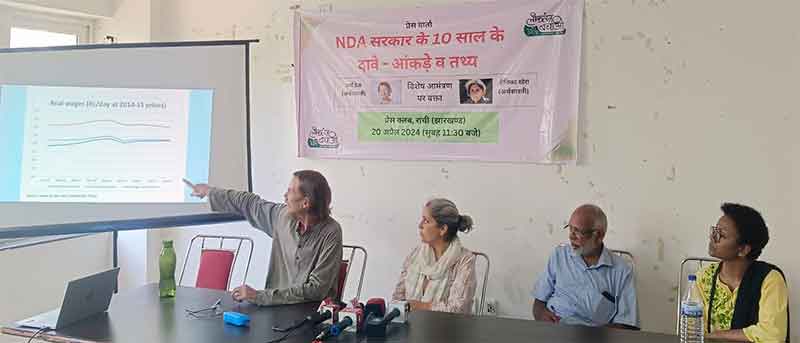
“India has been facing a tough challenge in creating decent jobs for its growing young population in the country and the crisis triggered by the COVID-19 pandemic has further aggravated the job challenge in India,” according to Dr. Jayan Jose Thomas, Member, Kerala State Planning Board and faculty at the IIT, Delhi. Dr Jayan Jose was speaking at the Web-Colloquium on “Macroeconomic theory in the context of budget 2021-22” organized by the Inter University Centre for Social Science Research and Extension (IUCSSRE) in collaboration with the K.N. Raj Centre (KNRC), Mahatma Gandhi University.
Dr Jayan said that the current crisis in the economy can be overcome only by creating new economic opportunities in India’s rural areas and by widening the sources of demand – that is, by raising the consumption of and investment for the poor and by setting up of industries linked to food processing or affordable housing in rural areas. He said that the “multiplier effects of such investments would be huge.”
Dr Jayan argued that “broadening the demand base requires policies that differ fundamentally from conventional economic ideas.” The mainstream argument has been that “firms should try to reduce costs by squeezing wages.” But “cutting wages will shrink markets further and deepen the crisis during a depression,” he warned. Instead, he said, “firms should assist in raising workers’ wages and incomes, and thereby, in enlarging the size of the markets.” “For rejuvenation of demand, it is critical that governments increase spending on the economy, stepping in areas such as infrastructure and innovation.” Dr Jayan stressed that the “government spending can boost the ‘animal spirits’ of the private investors, as had been suggested by John Maynard Keynes amidst the great depression of the 1930s.”
According to Dr Jayan, “with the budget for 2021-22, the government could announce a major expansion in public investment in infrastructure building and innovation. Enhancing government expenditures is important, especially in the areas of healthcare, education, agriculture and public transport.”
Dr Jayan noted that it was “indeed remarkable that the Government of Kerala announced an economic relief package on 20 March 2020 itself (amounting to Rs.20,000 crores).” “This was large and early enough to cover the income losses suffered by the poorer sections of the State’s workforce during the two months since the lockdown began on 25 March 2020. More importantly, the steps taken by the government in Kerala to ensure social security and improve people’s lives will help stimulate effective demand and thereby contribute to income growth and economic recovery.”
However, according to Dr Jayan, “with a slowing down in the growth of its working age population, Kerala will have to identify new sectors for its future growth, which will be high on value addition and are based on modern technologies.” Drawing attention to the Kerala State budget notes, he said that “a focus on innovation and knowledge-based industries will be the key to propel the State into a new stage in economic transformation.”
According to Dr. V. Mathew Kurian, Joint Director of KNRC, the current economic crisis across the world cannot be squarely addressed with any radical measures in the background of the continuing pandemic. Neo-Keynesianism reigns supreme in such a context, calling for a revisit to the much-hyped neoliberalism and its pervasive interventions across diverse spheres of human activity. Hence any alternative package to neoliberalism is a welcome step in the present scenario of world-wide crisis. Dr Kurian said that no country can afford to sidestep social security and welfarism in a situation of growing impoverishment and the Kerala budget 2021-22 is a clear instance of how a government can step in to mitigate the social crises generated by economic slump. Dr. Jose Naduthotty, faculty, KNRC, however, argued that the Kerala budget this time should have been an ‘interim budget’ considering the forthcoming state assembly elections to be held in two months’ time. Dr Jose also said that the COVID relief package put in place by the Union Government was apparently very huge but, in reality, not even 10 per cent of the package was beneficial to the poor people, the remaining being in the form of bank loans.
The world will have to put with the economic slowdown and the recessionary trends for some years if we go by the projections made by global financial institutions, according to Dr K.M. Seethi, Director, IUCSSRE. As the pandemic itself has come back in new waves in some countries with new strains emerging, it is difficult to predict the contours of the economic scenario. “This obviously has a gushing effect on diverse spheres of our activities with declining income, rising high employment, persistent setbacks in commodity trade, market rundown, and unrelenting accumulation of wealth in the hands of a few.” He said that “notwithstanding all setbacks, neoliberalism as an ideology is still reinforced by the neoclassical economic theory of rational expectations, by new institutionalism, and by the new forms of the rational choice school.” It inevitably “unleashes political and theoretical attacks on the State and on regulated markets.” While a few Global North countries had started revisiting some of the earlier theories of development and trade, they are extremely reluctant to encourage it in the Global South countries, evidently due to their advantage in global exchange relations. “This iniquitous model tends to generate more social tensions and conflicts in countries like India,” he said.
Dr Johney Johnson, Hon. Director of KN Raj Centre and Professor and Dean of Business and Management Sciences, MGU chaired the session. Dr. Mathew A. Varghese, faculty, School of International Relations and Politics and others spoke at the Web-Colloquium.
IF YOU LIKED THE ARTICLE SUPPORT PEOPLE’S JOURNALISM










































